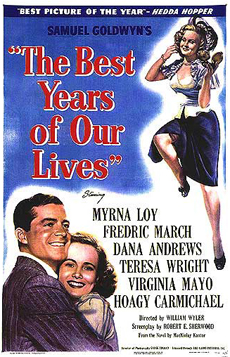The screenplay, written by Robert E. Sherwood, was based on a novel
called Glory for Me by MacKinlay Kantor, written in blank verse.
Sherwood had been the head of the Office of War Information during the
war, which is why producer Samuel Goldwyn approached him to write the
script.
The movie begins as three servicemen catch a ride home on a warplane
headed for decommission. This was a great symbolic gesture, because
as they near the airfield, below them they view hundreds and hundreds
of plane parts, ready to be scrapped, a visual representation of just
how many returning soldiers would be facing similar situations.
As they reenter civilian life, the three men face very different concerns.
Fred Derry (Dana Andrews), who was a flyboy and a recipient of honors
for valor, returns to his new bride, whom he met while in basic training.
He must deal with an uncertain employment situation, since the drug
store that previously employed him as a soda jerk has been bought by
a national chain. He longs for a more important, better paying job.
Soon, he discovers that his experience in the military doesn't mean
much in the civilian world.
Not only that, but his wife, Marie (Virginia Mayo), who had been making
good money working in a nightclub during the war, resents the fact that
he demands to be the single wage earner. She nags him about his career
failures. Their personality differences lead to further stress in the
marriage.
Al Stephenson, an Army officer, returns home to his wife, his two children,
and his job at a bank. Of course, he's in for some changes, too. His
children have blossomed into young adults, and his employer immediately
promotes him to be the head of the small loans department. His primary
job is to say yay or nay on small loans for returning servicemen. In
this capacity, he differs from the bank's policies, which frown upon
taking risks. By contrast, he feels it's important to invest in the
future of the country.
The final returning serviceman, Homer Parrish, was an infantryman who
lost both of his hands, replaced with prosthetic hooks. He has had occupational
therapy which taught him to use them with an amazing amount of skill.
Homer, however, is touchy about people trying to do things for him.
When he returns home to his loving girlfriend and family, he must confront
the fact that his life has forever changed, a difficult task, despite
the love and support.
Homer is played by Harold Russell, a real-life veteran and double amputee.
For his role, he earned both a Best Supporting Actor Oscar and an honorary
award "for bringing hope and courage to his fellow veterans through
his appearance." He was the only actor to win two Academy Awards
for the same role.
Of course, there are further complications, namely in the love department.
Homer's girlfriend had been looking forward to him marrying her upon
his return, but he insists on deferring their plans, because he can't
imagine her being happy spending the rest of her life with him, given
his disability.
As Fred's marriage sours, his relationship to the Stephensons becomes
complicated as he falls for the daughter, Peggy (Teresa Wright). This
naturally strains his friendship with Al, who does not want to see his
daughter involved with a married man.
The movie shifts back and forth between the three characters. Sometimes
they seek out each other's company and other times, they run into each
other in public places, such as the bar owned by Homer's uncle, Butch,
played by award-winning songwriter Hoagy Carmichael. Uncle Butch is
one cool cucumber, by the way, encouraging his nephew to get beyond
his depression, showing him there are still ways to grow and learn.
For example, he teaches him how to play a rudimentary song on the piano.
Just like Mrs. Miniver, the movie wisely avoids lapsing into
melodrama, instead sticking to well-crafted dialogue that sounds like
it could, indeed, be coming out of the mouths of people in similar circumstances.
The soundtrack is only used minimally, and the sets, while they are
clearly sound stages and not locations, look very much like a small,
rural town, down to the run-down hovel where Fred's parents live. Wyler
deliberately tried for a naturalistic look, building all the sets smaller
than life-size and buying all costumes off the rack, requiring the actors
to wear them before the filming, to make them appear worn.
Wyler, a veteran himself, went even further than that, hiring each
member of the crew — from props to grips to mixers — from
the ranks of World War II veterans. This was his first postwar movie.
He discovered Harold Russell in an Army training film, "Diary of
a Sergeant," in which he appeared in a section discussing the rehabilitation
of wounded servicemen.
Much like Mrs. Miniver could help modern viewers understand
what it might have been like to live through the German blitz, The
Best Years of Our Lives draws attention to issues faced not just
by World War II vets but by every returning veteran. Whether they've
experienced a life-changing injury or whether they were simply away
their family and their hometown for several years, they have to find
a way to readjust to civilian life.
Wyler's careful attention to detail earned him box office success:
the movie was the most successful film since Gone with the Wind,
released seven years earlier. In addition to the Best Picture and
Best Supporting Actor wins, the picture also received Best Actor in
a Leading Role (Fredric March), Best Director, Best Film Editing, Best
Music and Best Writing of a Screenplay.
Overall, I found the movie to be fascinating, depicting aspects and
issues about World War II which are seldom discussed any more. Yet,
they are issues that are still relevant today and will remain relevant
as long as our troops serve overseas.
Rating (out of 5): ****
Musings
on Best Picture Winners


